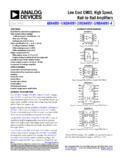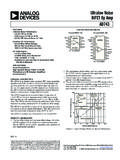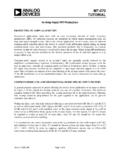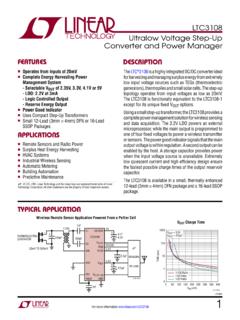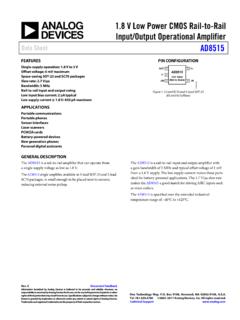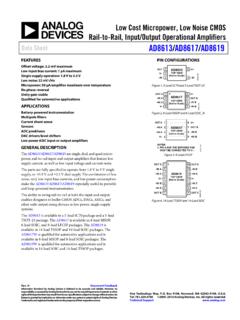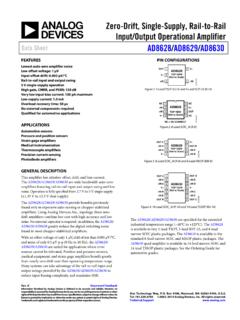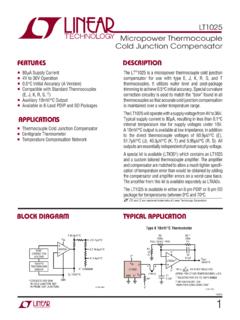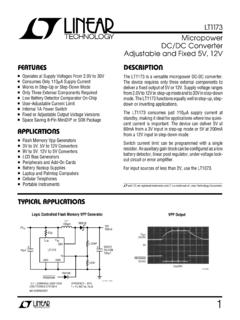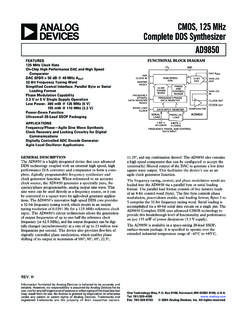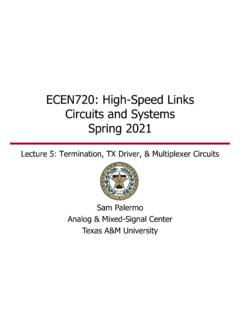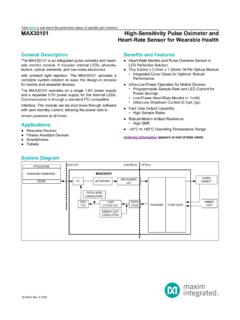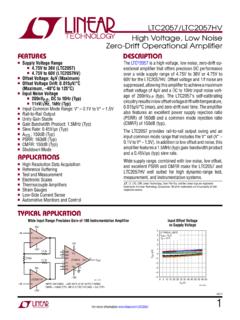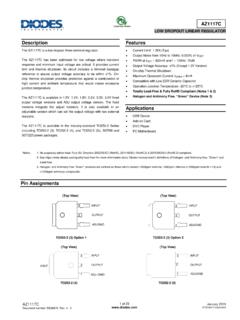Transcription of 6.5 V, 2 A, Ultralow Noise, High PSRR, Fast Transient ...
1 V, 2 A, Ultralow Noise, high PSRR, fast Transient response cmos LDO. data Sheet ADM7172. FEATURES TYPICAL APPLICATION CIRCUIT. Input voltage range: V to V. VIN = 5V. ADM7172 VOUT = Maximum load current: 2 A VIN VOUT. CIN VIN VOUT COUT. Low noise: 5 V rms independent of output voltage at F F. SENSE. 100 Hz to 100 kHz ON. fast Transient response : s for 1 mA to A load step EN SS. OFF. CSS. 60 dB PSRR at 100 kHz GND 1nF. 12250-001. Low dropout voltage: 172 mV at 2 A load, VOUT = 3 V. Initial accuracy: (minimum), +1% (maximum). Figure 1. ADM7172 with Fixed Output Voltage, V. Accuracy over line, load, and temperature: Quiescent current, IGND = mA with no load Inrush current can be controlled by adjusting the start-up time Low shutdown current: A at VIN = 5 V via the soft start pin. The typical start-up time with a 1 nF soft Stable with small F ceramic output capacitor start capacitor is ms.
2 Adjustable and fixed output voltage options: V to V The ADM7172 regulator output noise is 5 V rms, independent Adjustable output from V to VIN VDO of the output voltage. The ADM7172 is available in an 8-lead, Precision enable 3 mm 3 mm LFCSP, making it not only a very compact solution, Adjustable soft start but also providing excellent thermal performance for applications 8-lead 3 mm 3 mm LFCSP package requiring up to 2 A of output current in a small, low profile Supported by ADIsimPower tool footprint. APPLICATIONS T. Regulation to noise sensitive applications: ADC and DAC. circuits, precision amplifiers, PLLs/VCOs, and clocking ICs 1. Communications and infrastructure Medical and healthcare Industrial and instrumentation GENERAL DESCRIPTION 2. The ADM7172 is a cmos , low dropout linear regulator (LDO). that operates from V to V and provides up to 2 A of output current.
3 This high output current LDO is ideal for regulation of high performance analog and mixed-signal circuits operating from 6 V down to V rails. Using an advanced proprietary 12250-002. CH1 BW CH2 20mV B. W M400ns A CH3 100mV. architecture, the device provides high power supply rejection T and low noise, and achieves excellent line and load Transient Figure 2. Transient response (Trace 2), 1 mA to A Load Step in 400 ns (Trace 1). response with just a small F ceramic output capacitor. Load Table 1. Related devices Transient response is typically s for a 1 mA to A load step. Device Input Voltage Output Current Package The ADM7172 is available in 17 fixed output voltage options. ADM7170 V to V 500 mA 8-lead LFCSP. The following voltages are available from stock: V, V, ADM7171 V to V 1A 8-lead LFCSP. V, V, V, V, and V. Additional voltages that are available by special order are: V, V, V, V, V, V, V, V, V, and V.
4 An adjustable version is also available that allows output voltages that range from V. to VIN VDO with an external feedback divider. Rev. C Document Feedback Information furnished by analog devices is believed to be accurate and reliable. However, no responsibility is assumed by analog devices for its use, nor for any infringements of patents or other rights of third parties that may result from its use. Specifications subject to change without notice. No One Technology Way, Box 9106, Norwood, MA 02062-9106, license is granted by implication or otherwise under any patent or patent rights of analog devices . Tel: 2014 2015 analog devices , Inc. All rights reserved. Trademarks and registered trademarks are the property of their respective owners. Technical Support ADM7172 data Sheet TABLE OF CONTENTS. Features .. 1 ADIsimPower Design Tool.
5 17 Applications .. 1 Capacitor Selection .. 17 General Description .. 1 Programmable Precision Enable .. 18 Typical Application Circuit .. 1 Undervoltage Lockout .. 18 Revision History .. 2 Soft Start .. 18 3 Noise Reduction of the ADM7172 in Adjustable Mode .. 19 Input and Output Capacitor, Recommended Specifications .. 4 Effect of Noise Reduction on Start-Up Time .. 19 Absolute Maximum 5 Current-Limit and Thermal Overload Protection .. 20 Thermal data .. 5 Thermal 20 Thermal Resistance .. 5 Typical Applications Circuits .. 21 ESD Caution .. 5 Printed Circuit Board Layout Considerations .. 22 Pin Configuration and Function Descriptions .. 6 Outline Dimensions .. 23 Typical Performance Characteristics .. 7 Ordering Guide .. 23 Theory of Operation .. 16 Applications Information .. 17 REVISION HISTORY. 8/15 Rev. B to Rev.
6 C. Change to Soft Start Section .. 19. Added Effect of Noise Reduction on Start-Up Time Section .. 19. 12/14 Rev. A to Rev. B. Changes to Figure 2 .. 1. Changes to Figure 48 to Figure 51 .. 14. Changes to Figure 52 to Figure 55 .. 15. Changes to Figure 58 .. 17. 8/14 Rev. 0 to Rev. A. Changes to Ordering Guide .. 23. 7/14 Revision 0: Initial Version Rev. C | Page 2 of 23. data Sheet ADM7172. SPECIFICATIONS. VIN = (VOUT + V) or V (whichever is greater), EN = VIN, ILOAD = 10 mA, CIN = COUT = F, TA = 25 C for typical specifications, TJ = 40 C to +125 C for minimum/maximum specifications, unless otherwise noted. Table 2. Parameter Symbol Test Conditions/Comments Min Typ Max Unit INPUT VOLTAGE RANGE VIN V. LOAD CURRENT ILOAD 2 A. OPERATING SUPPLY CURRENT IGND ILOAD = 0 A mA. ILOAD = 2 A mA. SHUTDOWN CURRENT IGND-SD EN = GND, VIN = 5 V A.
7 OUTPUT VOLTAGE ACCURACY. Fixed Output Voltage Accuracy VOUT ILOAD = 10 mA, TJ = 25 C +1 %. 100 A < ILOAD < 2 A, VIN = (VOUT + V) to V + %. Adjustable Output Voltage VSENSE ILOAD = 10 mA V. Accuracy 10 mA < ILOAD < 2 A, VIN = (VOUT + V) to V V. REGULATION. Line VOUT/ VIN VIN = (VOUT + V) to V + %/V. Load VOUT/ ILOAD ILOAD = 100 A to 2 A %/A. SENSE INPUT BIAS CURRENT SENSEI-BIAS 100 A < ILOAD < 2 A, VIN = (VOUT + V) to V 1 nA. DROPOUT VOLTAGE 1 VDROPOUT ILOAD = 500 mA, VOUT = 3 V 42 70 mV. ILOAD = 1 A, VOUT = 3 V 84 135 mV. ILOAD = 2 A, VOUT = 3 V 172 270 mV. OUTPUT NOISE OUTNOISE 10 Hz to 100 kHz, all fixed output voltages 6 V rms 100 Hz to 100 kHz, all fixed output voltages 5 V rms Noise Spectral Density 100 Hz, all fixed output voltages 110 nV/ Hz 1 kHz, all fixed output voltages 40 nV/ Hz 10 kHz, all fixed output voltages 20 nV/ Hz 100 kHz, all fixed output voltages 12 nV/ Hz POWER SUPPLY REJECTION RATIO PSRR 100 kHz, VIN = V, VOUT = 3 V, ILOAD = A, CSS = 0 nF 60 dB.
8 100 kHz, VIN = V, VOUT = 3 V, ILOAD = A, CSS = 0 nF 53 dB. 100 kHz, VIN = V, VOUT = 3 V, ILOAD = A, CSS = 0 nF 42 dB. 1 MHz, VIN = V, VOUT = 3 V, ILOAD = A, CSS = 0 nF 31 dB. 1 MHz, VIN = V, VOUT = 3 V, ILOAD = A, CSS = 0 nF 30 dB. 1 MHz, VIN = V, VOUT = 3 V, ILOAD = A, CSS = 0 nF 20 dB. Transient LOAD response tTR-REC Time for output voltage to settle within VSETTLE from s VDEV for a 1 mA to A load step, load step rise time = 400 ns VDEV Output voltage deviation due to 1 mA to A load step 35 mV. VSETTLE Output voltage deviation after Transient load response %. time (tTR-REC) has passed, VOUT = 5 V, COUT = F. START-UP TIME 2 tSTART-UP VOUT = 5 V, CSS = 0 nF 380 s VOUT = 5 V, CSS = 1 nF ms SOFT START CURRENT ISS VIN = 5 V 1 A. CURRENT-LIMIT THRESHOLD 3 ILIMIT A. VOUT PULL-DOWN RESISTANCE VOUT-PULL EN = 0 V, VOUT = 1 V 11 k.
9 THERMAL SHUTDOWN. Thermal Shutdown Threshold TSSD TJ rising 150 C. Thermal Shutdown Hysteresis TSSD-HYS 15 C. UNDERVOLTAGE THRESHOLDS. Input Voltage Rising UVLORISE V. Input Voltage Falling UVLOFALL V. Hysteresis UVLOHYS 200 mV. Rev. C | Page 3 of 23. ADM7172 data Sheet Parameter Symbol Test Conditions/Comments Min Typ Max Unit EN INPUT STANDBY V VIN V. EN Input Logic high ENSTBY- high V. EN Input Logic Low ENSTBY-LOW V. EN Input Logic Hysteresis ENSTBY-HYS 80 mV. EN INPUT PRECISION V VIN V. EN Input Logic high ENHIGH V. EN Input Logic Low ENLOW V. EN Input Logic Hysteresis ENHYS 100 mV. EN Input Leakage Current IEN-LKG EN = VIN or GND A. EN Input Delay Time TIEN-DLY From EN rising from 0 V to VIN to V VOUT 130 s 1. Dropout voltage is defined as the input-to-output voltage differential when the input voltage is set to the nominal output voltage.
10 Dropout applies only for output voltages greater than V. 2. Start-up time is defined as the time between the rising edge of EN to VOUT being at 90% of its nominal value. 3. Current-limit threshold is defined as the current at which the output voltage drops to 90% of the specified typical value. For example, the current limit for a V. output voltage is defined as the current that causes the output voltage to drop to 90% of V, or V. INPUT AND OUTPUT CAPACITOR, RECOMMENDED SPECIFICATIONS. Table 3. Parameter Symbol Test Conditions/Comments Min Typ Max Unit MINIMUM INPUT AND OUTPUT CAPACITANCE 1 CMIN TA = 40 C to +125 C F. CAPACITOR ESR RESR TA = 40 C to +125 C . 1. Ensure that the minimum input and output capacitance is greater than F over the full range of operating conditions. The full range of operating conditions in the application must be considered during device selection to ensure that the minimum capacitance specification is met.
